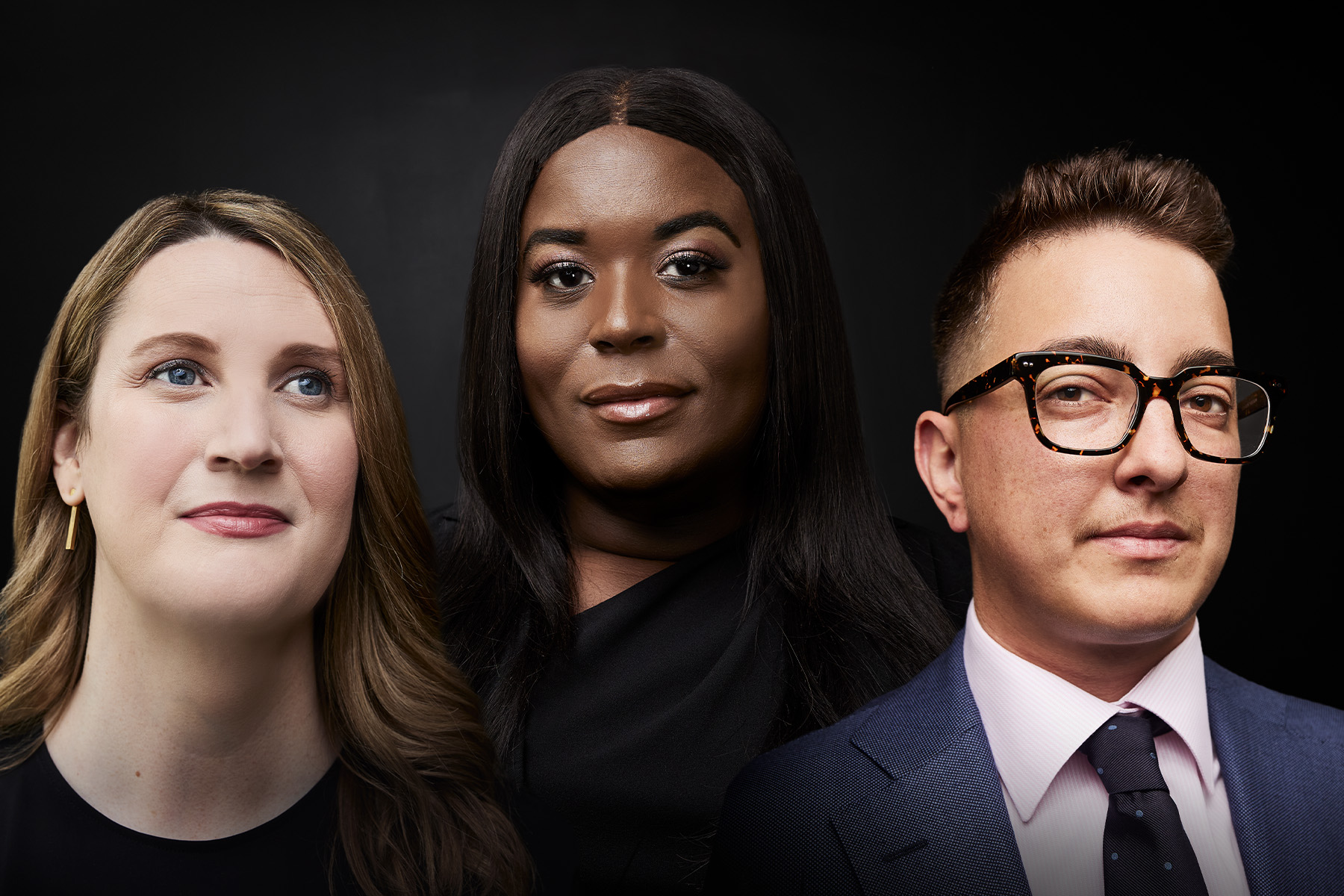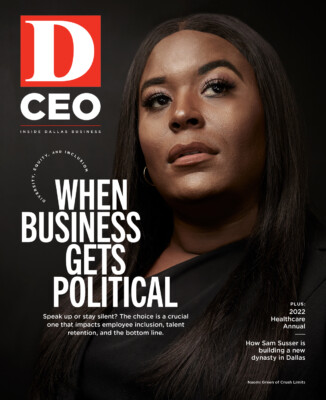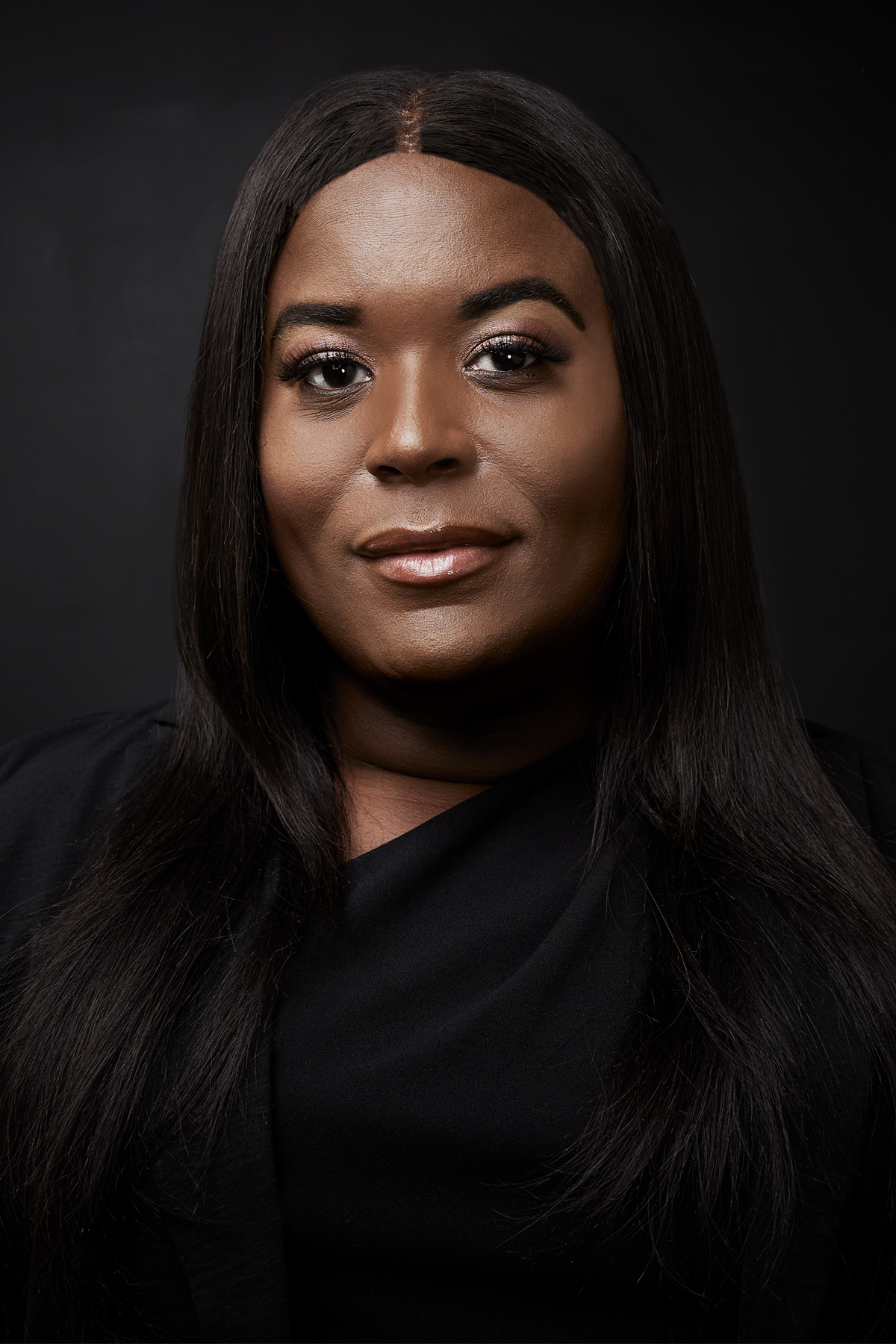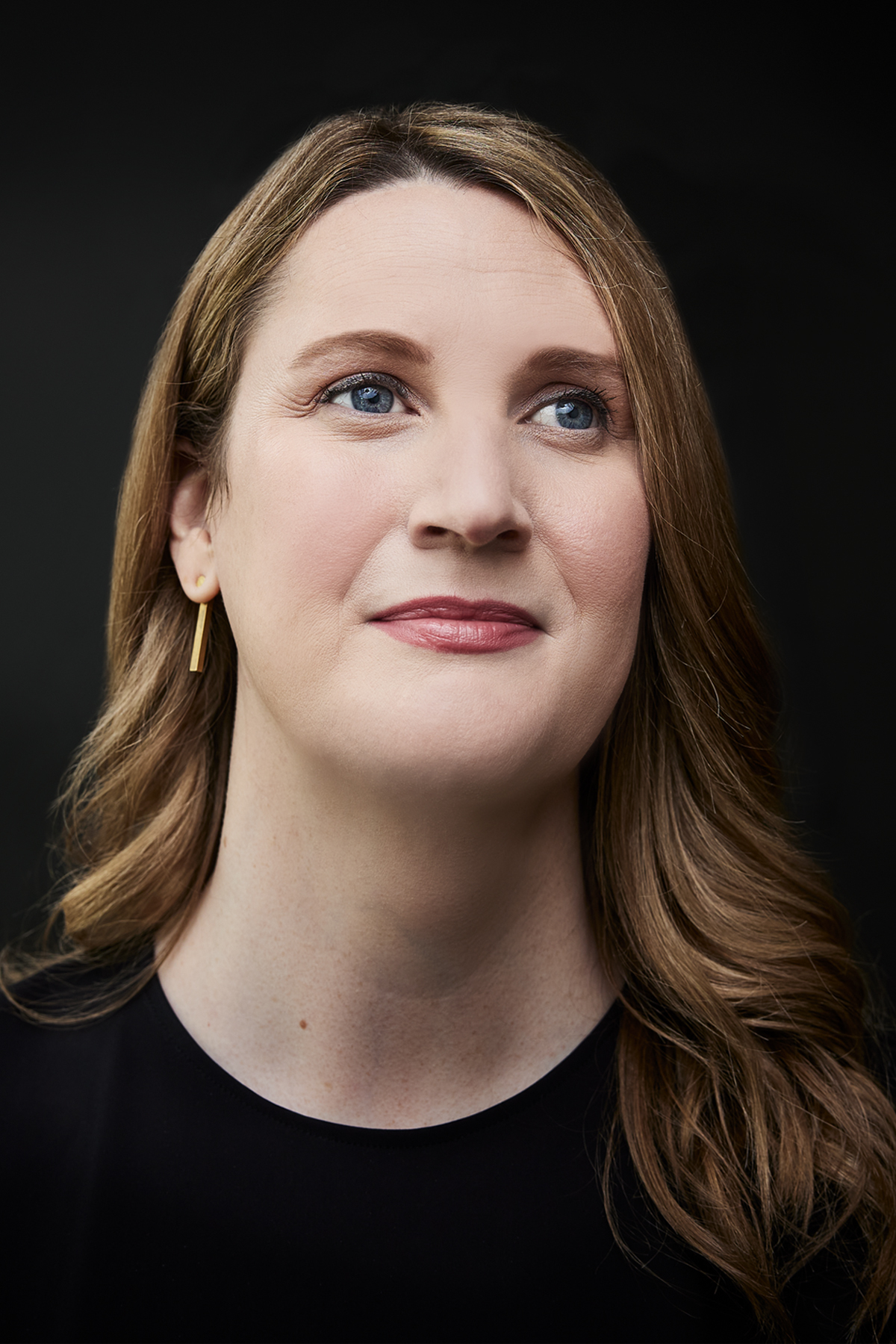According to Pew Research Center, about 5 percent of young adults in the United States say their gender is different from their sex assigned at birth. For adults of all ages, it’s 1.6 percent. About a quarter of adults say they have a trans friend (27 percent), 13 percent say they have a trans co-worker, and 10 percent say they have a trans family member. As a follow up to our first People of Pride report in 2019, and part of our 2022 Diversity, Equity, and Inclusion report on Business and Politics, we spoke with three North Texas transgender executives who shared their personal journeys with D CEO.
(she/her/hers)
Naomi Green
Consultant, Crush Limits
A graduate of Jackson State University who earned an MBA from the University of Missouri—St. Louis, Naomi Green moved to Dallas in 2018 and took a general manager role with Smoothie King. Soon thereafter, Green went to an urgent care facility in Garland after feeling some pain in her leg.
While keeping his distance from her and unwilling to do a close examination, the doctor told Green that she’d be just fine and sent her home without any medical charges or a care plan. When the pain persisted a couple of days later, Green’s mother insisted that she get a second opinion. Green went to a local emergency room and immediately saw a difference in care. The new doctor put her on IV fluids and ordered an ultrasound to uncover that she had a serious infection in her leg. He told her that it was only a matter of days before the infection could turn septic and she could have potentially lost her leg. “Immediately, I realized that the original urgent care doctor didn’t want to touch me or provide care because I was transgender,” Green says.
It took months, several rounds of antibiotics, and emergency surgery to fully heal herself. “A lot of things were going wrong at that time, and I started questioning whether I had made the right decision to move to Dallas,” Green says. Then, a friend introduced her to Abounding Prosperity, an organization whose mission is to address social and health disparities for Black, Indigenous, People of Color (BIPoC), and LGBTQ individuals. Green attended a panel discussion called, “Inviting Transparency,” and found her calling. “It was a lot of soul-searching but that was my aha moment,” Green says. “When I heard that panel, it spoke to my heart, and I knew that I had to get involved in the transgender community.”
Green accepted a job with Abounding Prosperity as a program manager. It was 2019 and a few months before the murder of 22-year-old transgender woman Muhlaysia Booker. “I was called to action,” Green says. “It was also the first time that I stood up loudly and proudly as an out transgender woman.”
Green left the nonprofit in 2022 to help develop B2C marketing strategies for a LGBTQ woman-owned consulting firm Crush Limits. In her new role, she provides companies both big and small with inclusion-focused guidance on human resources, employee training, recruitment, operations, and compliance. “I’m such a people person and I love building relationships,” she says. “What I love about my new job is being able to connect with business leaders. And at the core of what I do, I’m still getting to help people.”
(she/her/hers)
Avery Belyeu
South Central Regional Director, Lambda Legal
Born and raised in rural northern Florida, Avery Belyeu has forged a career path in community advocacy and nonprofits. Her first professional job after completing her undergraduate degree at Appalachian State University was during graduate school at the University of North Carolina at Greensboro in student affairs.
Despite the school having a large LGBTQ student population, there were no resources available for students. So, Belyeu helped create a safe zone training program to help train higher education professionals on the needs of LGBTQ students.
Belyeu moved to New York in 2011 and into an education director role for The Trevor Project, the world’s largest suicide prevention and crisis intervention organization for LGBTQ youth. After spending more than three years with the nonprofit, Belyeu brought her experience to the Suicide Prevention Resource Center in Boston.
“The goal with my career has always been to try to make the world a more just and equal place—particularly a place where all people and communities can thrive,” she says.
Belyeu moved to Dallas seven years ago and was named the regional director of Lambda Legal in 2018. Founded 49 years ago, it’s a civil rights organization that is committed to achieving full rights for LGBTQ individuals, as well as people living with HIV/AIDs, through litigation, education, and public policy work. “When you think about it, we are creating and affecting large-scale, systemic change,” Belyeu says. “Lambda Legal doesn’t just make individual lives better—we don’t just have an impact on small communities—we make our entire country better.”
A first-generation college student whose mother cleaned homes for a living and whose father worked in a grocery store, Belyeu grew up in a very religious household; her parents are Jehovah’s Witness. Expelled from the faith in her 20s when she came out as a gay man, Belyeu hasn’t seen her parents in 13 years. She knew she was transgender at the age of 25 and decided to transition five years later.
“I’ve always considered myself a feminist,” she says. “But honestly, the biggest thing that I was blindsided by in the transition process was sexism. I didn’t understand just how pervasive it is in our culture until I experienced it myself.”
Through attending the Temple Emanu-El in Dallas, Belyeu says she has found healing in religious spaces. And as one of a handful of trans women in a leadership position at a national LGBTQ organization, Belyeu says she sees herself not as a role model but as a possibility model. “I believe the table is big enough for all of us,” she says. “I am uncompromising in the belief that everyone should have a seat at the table.”
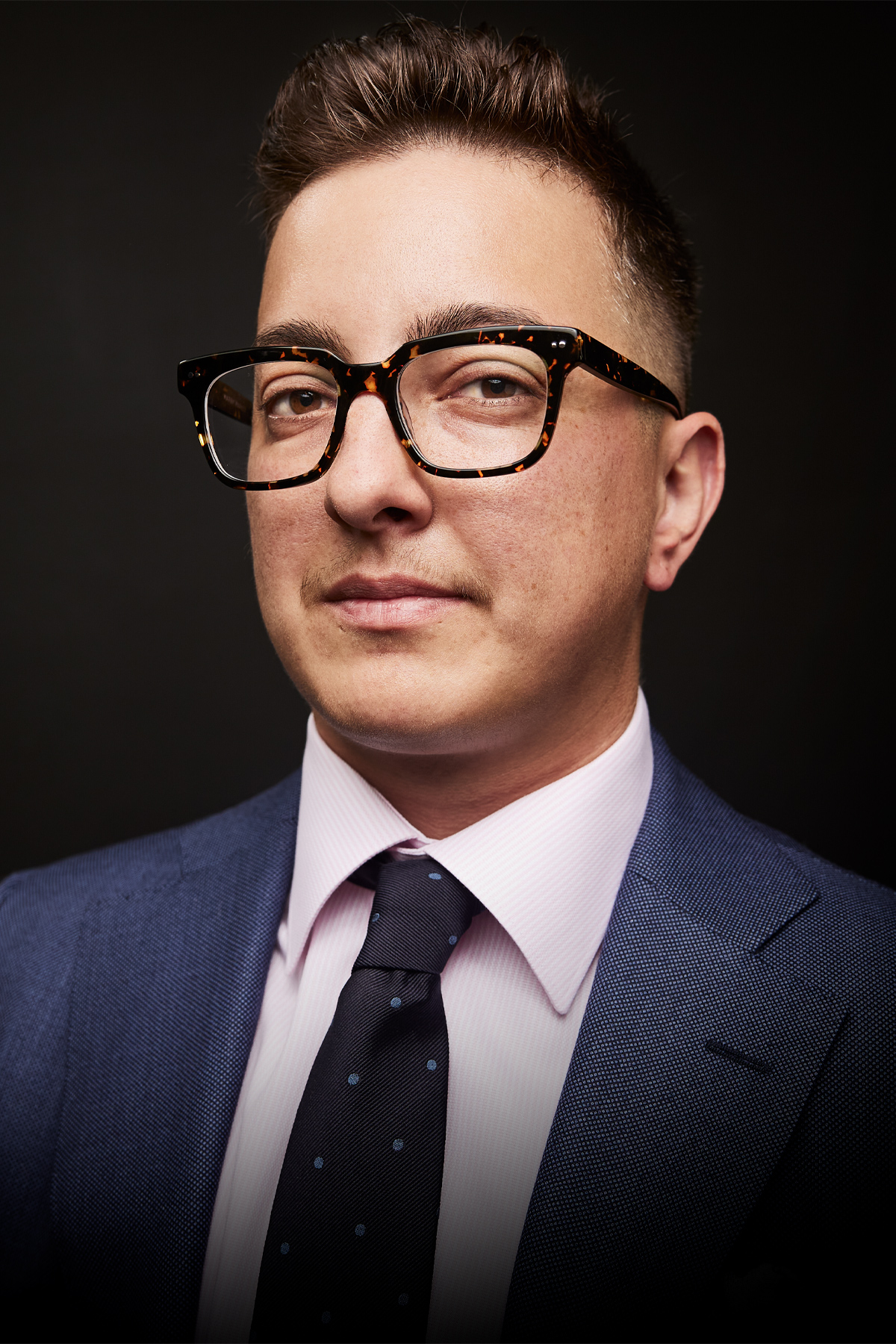
(he/him/his)
Jessie Kiannejad
Global Sales Account Manager, Hewlett Packard Enterprise
Born and raised in Plano to a first-generation immigrant parent who moved to the United States after the Iranian Revolution, Jessie Kiannejad came out as queer in his teen years. “My legal name is not Jessie, but I’ve always identified as Jessie,” he says.
“For as long as I can remember, I’ve always been attracted to women, and, through therapy, only recently was I able to identify the body dysmorphia I experienced growing up.”
After graduating from the University of North Texas in 2016, Kiannejad began his career in aviation and logistics. However, he didn’t feel comfortable at one of his first employers out of college, and so he involuntarily came out of the closet at the office. “I hid that part of me for a long time,” he says. “I didn’t talk about my personal life, and I certainly didn’t mix personal and professional.”
It wasn’t until 2019—and a change of industries—that Kiannejad felt comfortable to begin to show his true self at work. That’s also around the time that he met his future wife at a Dallas Pride event.
During the pandemic and working from home, and with his partner’s full support, Kiannejad began researching the transitioning process. He decided to have surgery and started hormones to aid in his transition from female to male. “There is no right or wrong way to transition,” he says. “You can choose to have hormones or you can choose to not have hormones. You can decide to have surgery or you can decide not to. For me, hormones and seeking gender-affirming medical care have given me more confidence. I can now better identify with my body, and I feel more like my whole self.”
Kiannejad also became very active in Hewlett Packard Enterprises’ Pride resource group, volunteering as vice president of the group and helping to draft resources for other LGBTQ employees. He officially came out as transgender at work in an internal e-mail to colleagues on International Transgender Day of Visibility. “It was the best thing ever,” Kiannejad says. “Now, I get to show up to work as my true and authentic self, and I don’t feel like I must hide who I am to co-workers. It is incredibly freeing.”
Kiannejad says that HPE’s LGBTQ ally group outnumbers its LGBTQ employees. “Allies are so important in the workplace because they have an influence that can often times carry more weight,” he says. “Just knowing that I have an incredible support group where I work every day is helpful, and I think allyship should be welcomed and celebrated in every workplace.”
Get the D CEO Newsletter
Author



